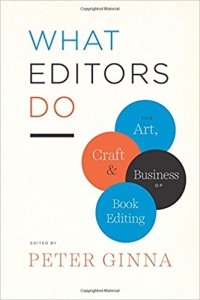Reviews
“Ginna has collected essays from 27 of his peers in the book business on everything from the importance of the author-editor relationship to the challenges of editing genre fiction to the ways editors must function as evangelists, creating buzz for their books.” – Entertainment Weekly
“Detailed and comprehensive in scope [with] essays by editors of almost all rank and genre….There are succinct and eloquent descriptions of the craft….When personal experience seeps in, it is funny and instructive.”—Times Literary Supplement
"This compilation of essays is a revealing and thorough exploration of the variety of functions held by editors who hold indispensable roles in the process of preparing a manuscript for publication. In What Editors Do, over twenty-five editors from small presses to large publishing houses share advice, insights into the inner workings of the publishing industry, and perspectives on editing as both an art and a craft. All readers and writers passionate about literature and the creative process will find valuable inspiration in this informative resource." – Poets & Writers
★ [Starred Review] This useful, down-to-the-bedrock collection of essays from 27 industry leaders on the art, craft, and business of book editing might very well qualify as exhaustive. For the generally curious, and those earning all or even part of their livelihood in some editorial capacity, this is a sturdy guide through often-hazardous textual terrain—an Art of War, if you will, for professional and neophyte alike. Ginna's contributors might not be names familiar to the reading public, but "editing is an invisible art where the very best work goes undetected. A little-known aspect of traditional publishing: best-selling authors often turn in manuscripts peppered with typos, poor grammar, and errors in continuity and logic. Explaining what distinguishes good from great books, literary agent Susan Rabiner's piece "The Other Side of the Desk" addresses conceptualization, that nebulous quality that ignites facts, narratives, and events into enthralling reads. Two authors represented by Rabiner's agency garnered Pulitzer Prizes. VERDICT: A vital resource for writers and readers seeking a comprehensive exploration into the author-editor relationship, the lifecycle of a book, and how editors for publishing houses big and small have adapted to an industry in constant flux.—Library Journal
"Ginna, the former publisher of Bloomsbury Press and a blogger at Doctor Syntax, collects essays by editors from many different segments of the industry, shedding light on the nature and value of their work. The book explores all aspects of the editing process from acquisition and manuscript development to ensuring sales success after a book hits the market. The book is peppered with memorable case studies, such as Erika Goldman’s account of acquiring Paul Harding’s much-rejected Tinkers manuscript and turning it into a Pulitzer Prize–winner for Bellevue Literary Press. These examples give an insider’s view of the combination of skill, hard work, and good fortune needed to succeed in the editorial profession. The book’s value comes from the diverse perspectives of the contributors, who range from Hachette Book Group CEO Michael Pietsch to freelance medical editor Katherine O’Moore-Klopf. This variety ensures a multifaceted view of the many roles—including critic, mentor, salesperson, and business executive—encompassed by the job of book editor. These honest and unflinching accounts from publishing insiders are a valuable primer on the field at a time where the value of editors and publishers has been increasingly questioned." – Publishers Weekly
"What’s not to like about What Editors Do? This collection of essays traces the role of book editors from acquisition to publication and samples niches like editing genre fiction and working with self-publishing authors. What’s more, the 27 contributors represent a “who’s who” of American publishing: Betsy Lerner, Carol Fisher Saller, Jonathan Karp, Scott Norton, Susan Rabiner, Michael Pietsch, Katharine O’Moore-Klopf, Jane Friedman … the list goes on. Between them, they exemplify the breadth and diversity of the industry. The editor of this collection, Peter Ginna, has himself worked as a book editor and publisher in New York since 1982. As Ginna explains in the introduction, What Editors Do is inspired by Gerald Gross’s Editors on Editing, an essay collection first published in 1962. At the time, and for decades after, Gross’s book was the only guide available that was written by editors for editors on their craft. What Editors Do updates this original concept for editors in the age of Amazon." – The Editor's Weekly
“Every editor should read this book. It’s a top-notch resource no matter what niche or stage of career an editor is in.” – Editors Canada
“Exceptionally well written. The prose is authoritative, entertaining, and informative. Each chapter is written by a leader in that topic’s realm.” – Copyediting
“What Editors Do is the most informative and intelligent book on the work of publishing that you can own. In this collection, some of the best people involved in publishing in the 21st century write lucidly and engrossingly about everything that is important to editors and writers. A lively book that will also be great armchair reading for any book lover. As an editor and publisher of thirty years, I cannot recommend this book more highly.” – Shaye Areheart, Director, Columbia Publishing Course
“Editors do a lot—patiently, coolly, analytically, but also boldly, urgently, fervently. Their work, almost always invisible, makes ideas speak and books fly. What Editors Do shows just how varied—and valuable—editors are, especially now when the well-edited book is more necessary than ever.” –William Germano, author of Getting It Published and From Dissertation to Book
“What Editors Do is essential reading for anyone who wants to edit, be edited, or learn how publishing really works. It’s also thoroughly delightful—the chance to learn from a wide variety of industry greats as they share frank and fascinating stories about how all sorts of books, famous and unknown, came to life. I’ve worked in publishing for more than three decades but still learned volumes from this book.” – Will Schwalbe, executive vice president, Macmillan, and author of The End of Your Life Book Club and Books for Living


